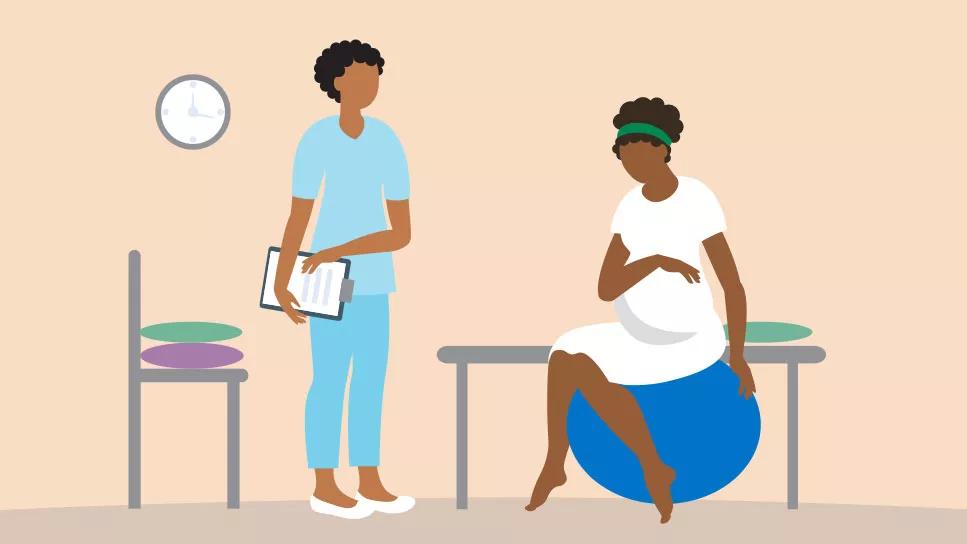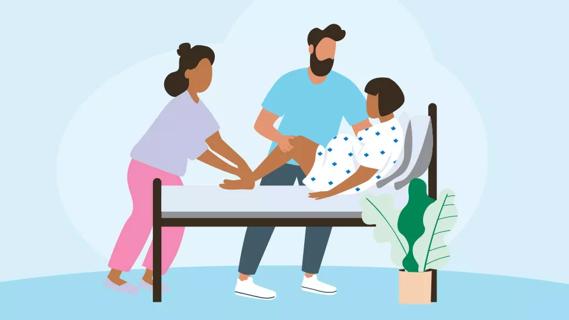Advertisement
One is a trained care professional, while the other is a medical caregiver, but both can be important parts of your birthing team

When you or your partner is pregnant, you have a lot to consider. Baby names. Room decor. Shower registries.
Advertisement
Cleveland Clinic is a non-profit academic medical center. Advertising on our site helps support our mission. We do not endorse non-Cleveland Clinic products or services. Policy
And then, there’s the medical aspect of your pregnancy care. Scheduling your prenatal visits. Considering your birth plan. Choosing who will deliver your baby. And knowing who’ll be in the room with you when it’s delivery time.
The team of professionals you assemble to be by your side throughout your pregnancy and labor can make a big difference in your comfort and birthing experience.
You may think an Ob/Gyn is the person to guide you through your pregnancy and delivery. And they can be. But did you know you may have other options?
We’re talking about nurse midwives and certified doulas.
What’s the difference between a nurse midwife and a doula? Who does what? And do you need them both? We talked with certified nurse midwife Tamara Noy, MSN, CNM, about nurse midwives vs. doulas so you can know your options.
Nurse midwives and certified doulas are two parts of a birthing team. Both have different training and education and can provide different kinds of support and care during your pregnancy, labor and beyond.
Certified nurse midwives have master’s degrees in midwifery and often have experience working as labor and delivery nurses. Like Ob/Gyns, they support gynecological health and pregnancy care from a medical perspective. They can deliver your baby vaginally.
“Unlike Ob/Gyns, who are trained surgeons, certified nurse midwives are trained as registered nurses. We view pregnancy as a normal physiologic process and focus on treating the whole person,” Noy explains.
Certified doulas don’t necessarily have degrees in healthcare. They earn credentials and accreditations from dedicated training agencies or programs. Doulas don’t offer medical advice or care. They don’t “catch” the baby, so to speak. Their role is to provide education and support to birthing parents and to act as their advocates.
If you’re having your baby outside of your home, you’ll need either an Ob/Gyn or a certified nurse midwife to deliver your baby. Doulas are optional.
Here’s a high-level overview of the similarities and differences between Ob/Gyns, nurse midwives and certified doulas.
| Ob/Gyn | Certified nurse midwife | Certified doula | |
|---|---|---|---|
| Training and experience | Medical doctorate and residency in obstetrics and gynecology. | Master’s degree in nursing. Often have experience and education as a labor and delivery nurse. State certification as an advanced practice registered nurse. Board certification as a certified nurse midwife. | State certifications or training program credentials. |
| Top goal | Provide medical gynecological care, including surgery, managing medical complications and providing high-risk care. | Provide medical gynecological care. | Provide physical and emotional comfort and act as an advocate for birthing parents. |
| Care provided outside of pregnancy and delivery | Gynecological health, including STI care, yeast infections, annual exams, breastfeeding (chestfeeding), prescribing medication and performing gynecological surgery. | Routine gynecological health, including STI care, yeast infections, annual exams, breastfeeding (chestfeeding) and prescribing medication. | Postpartum support services, including helping parents adapt to their new roles. |
| Can they deliver a baby vaginally? | Yes. | Yes. | No. |
| Do they care for high-risk pregnancies? | Yes, including multiple births, c-sections and use of forceps and vacuums. | No. | Yes, but only as support people, not to give medical advice or perform procedures. |
| Training and experience | |||
| Ob/Gyn | |||
| Medical doctorate and residency in obstetrics and gynecology. | |||
| Certified nurse midwife | |||
| Master’s degree in nursing. Often have experience and education as a labor and delivery nurse. State certification as an advanced practice registered nurse. Board certification as a certified nurse midwife. | |||
| Certified doula | |||
| State certifications or training program credentials. | |||
| Top goal | |||
| Ob/Gyn | |||
| Provide medical gynecological care, including surgery, managing medical complications and providing high-risk care. | |||
| Certified nurse midwife | |||
| Provide medical gynecological care. | |||
| Certified doula | |||
| Provide physical and emotional comfort and act as an advocate for birthing parents. | |||
| Care provided outside of pregnancy and delivery | |||
| Ob/Gyn | |||
| Gynecological health, including STI care, yeast infections, annual exams, breastfeeding (chestfeeding), prescribing medication and performing gynecological surgery. | |||
| Certified nurse midwife | |||
| Routine gynecological health, including STI care, yeast infections, annual exams, breastfeeding (chestfeeding) and prescribing medication. | |||
| Certified doula | |||
| Postpartum support services, including helping parents adapt to their new roles. | |||
| Can they deliver a baby vaginally? | |||
| Ob/Gyn | |||
| Yes. | |||
| Certified nurse midwife | |||
| Yes. | |||
| Certified doula | |||
| No. | |||
| Do they care for high-risk pregnancies? | |||
| Ob/Gyn | |||
| Yes, including multiple births, c-sections and use of forceps and vacuums. | |||
| Certified nurse midwife | |||
| No. | |||
| Certified doula | |||
| Yes, but only as support people, not to give medical advice or perform procedures. |
It’s important to note that we’re talking about nurse midwives and certified doulas here. Sure, there are people out there who will call themselves a “midwife” or a “doula,” without necessarily having the education, accreditations or experience that are recommended.
Advertisement
They’re called “lay” providers. It’s like the difference between your neighbor who can change the oil on their car versus a mechanic at a credible auto shop.
Most hospitals and birthing centers don’t allow lay midwives or lay doulas to provide care. So, if you’ll be giving birth outside of your home, you’ll want to ensure the midwife and doula you choose have the necessary credentials.
Historically, pregnancy and labor caregivers weren’t the medical specialists we think of today. While pregnant people today routinely visit doctors and hospitals for their prenatal care and delivery, that hasn’t always been the standard.
“The history of midwifery in the U.S. dates back to pre-Civil War times. In the Antebellum South, enslaved women and other underrepresented people who weren’t formally trained learned to provide support and birth babies in their communities, particularly for other enslaved people. It was a kind of calling for them,” Noy shares.
“You’d have people in your community who helped birth you. And then, they help you give birth to your children, and your sister’s children and your neighbors’ children. And so on. They were community healers, and birth was a communal event.”
That tradition isn’t entirely lost.
Nurse midwives today are educated healthcare providers who work in private practices, birthing centers and hospitals around the country. And while today’s nurse midwives aren’t necessarily the people you’ve known your whole life, they continue to uphold a philosophy similar to the lay midwives of past generations. That includes practices like listening deeply to your wishes and engaging you in shared decision-making.
“As midwives, we put a big emphasis on giving people autonomy,” Noy says. “Ob/Gyns are trained as medical care providers and surgeons, and if you need that, you need that. But some people who don’t need that level of medical intervention will choose a certified nurse midwife because we’re trained more holistically to care for low-risk pregnancies. So, we can be more focused more on sharing and holding space with people.”
Nurse midwives are medical specialists who provide care like:
Advertisement
Certified doulas are trained care professionals, not medical caregivers. Their focus is on providing physical and emotional support throughout your pregnancy, delivery and the postpartum period.
Doulas can provide support and education that’s on the periphery of your medical well-being, too.
“Certified doulas provide extra information and support to pregnant people that not all healthcare providers can provide, given the constraints of office visits and busy schedules," Noy explains.
“Pregnant people who enlist the help of a doula get to know that person well throughout the course of their journey. Certified doulas can provide more holistic support to make sure your pregnancy, delivery and postpartum period is more focused on you and your personal wants and needs.”
In a way, having a certified doula during your pregnancy is like having a trusted friend in your corner — a friend who is highly experienced in birthing and the intricacies of pregnancy and the postpartum period.
“Certified doulas can offer an immeasurable amount of support,” Noy continues. “They're very familiar with what people need during labor and are a valuable asset both to birthing people and their healthcare providers.”
Different doulas provide different kinds of services. Some may specialize in pregnancy and delivery, while others may provide a full spectrum of services, including supporting you after your baby arrives. The services they may offer include:
Researchers have suggested that using a birth doula can lead to better birth outcomes. That includes:
Despite that, surveys show that only about 6% of pregnant people give birth with doula support.
Why?
Some people just don’t know that doulas are available to them or don’t understand their benefits. For others, access to a certified doula can be a barrier. Some insurance plans don’t cover doula care, and the out-of-pocket costs can be too much.
Noy suggests seeking out local nonprofit organizations that may provide certified doulas at little or no cost to you. Some doulas may offer pro bono support as well.
“There are organizations that may be able to help you find doula care. Those are usually specific to groups of people with high mortality rates, often for Black and Hispanic birthing parents in particular,” Noy clarifies.
Advertisement
“But we’re seeing a big push from the American College of Obstetrics and Gynecology and American College of Nurse-Midwives to recommend that more birthing people need continuous labor support in order to meet their goals.”
If your resources allow for it, Noy suggests that certified doulas may be most helpful for people who:
Whether you’re working with an Ob/Gyn or midwife and whether you use a doula or not, Noy advises that childbirth education classes are an important part of preparing for labor and delivery.
The more you know, the more opportunities you’ll have for a healthy pregnancy and a smoother transition to life after delivery. You’ve got this.
Advertisement
Learn more about our editorial process.
Advertisement

Obesity, age and preexisting heart conditions can all raise your risk of cardiovascular disease during pregnancy

Science is mixed, but if you want to try stretching your perineum, here’s how to do it safely

The birthing process can take longer than you might expect, and plans can always change

While it’s probably not your most fertile time, it is possible to get pregnant if you have unprotected sex during your period

Plan ahead, pack that bag, be attentive and be an advocate

Sympathetic pregnancy is real and can cause nausea, vomiting, weight gain, fatigue and other symptoms

Sitting, squatting and side-lying may provide a more comfortable labor and delivery

Everyone’s unique, and there’s no exact checklist of symptoms, but you may feel contractions, cramps and pelvic pressure

Focus on your body’s metabolic set point by eating healthy foods, making exercise a part of your routine and reducing stress

PFAS chemicals may make life easier — but they aren’t always so easy on the human body

While there’s little risk in trying this hair care treatment, there isn’t much science to back up the claims